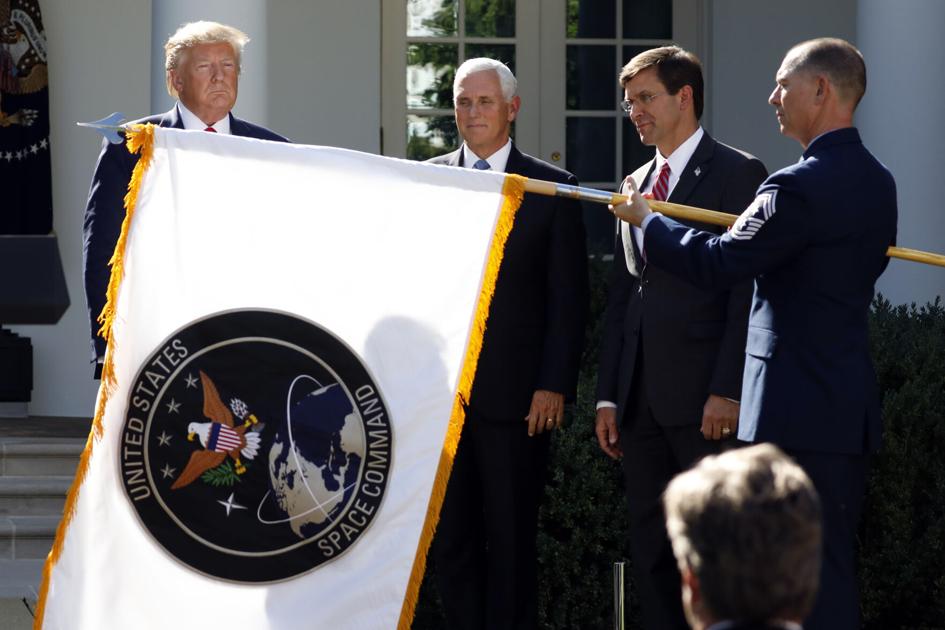Colorado’s federal lawmakers on Tuesday launched a letter to President Joe Biden that would stop the move of U.S. Space Command pending a probe into the Trump administration’s decision to relocate it to Alabama from Colorado.
“We write to request you conduct a thorough review of the Trump administration’s last–minute decision to move U.S. Space Command from Colorado Springs, Colorado, to Huntsville, Alabama and suspend any actions to relocate the headquarters until you complete the review,” the state’s seven members of the House and two senators wrote. “This move undermines our ability to respond to the threats in space and is disruptive to the current mission. Additionally, significant evidence exists that the process was neither fair nor impartial and that President Trump’s political considerations influenced the final decision.”
The letter comes as Biden gains control over the Pentagon, with Defense Secretary Lloyd Austin taking charge. The involvement of the state’s Democratic senators also will raise the profile of the request in the White House, since Democrats now control that chamber .
The Trump administration announced the move to Huntsville earlier this month. Sources say the president, in a show of political loyalty, overrode the Pentagon to personally award to Alabama the 1,400 troops who oversee military missions in space.
In addition to allegations of political skullduggery, the Colorado lawmakers’ letter detailed how the move could harm American ambitions in orbit.
“Our national security should be the most important consideration for this critical basing decision,” said the letter, led by Democratic Sen. Michael Bennet. “This decision will uproot the service members and civilians currently conducting the mission in Colorado and remove them from the nexus of military and intelligence space operations.”
Congress ordered the re-establishment of U.S. Space Command in 2019 amid rising fears that rivals including Russia and China could target U.S. military satellites in a future war. Losing a battle in space could lose America a war on the ground, sea or air, since U.S. troops are reliant on satellites for navigation, communications and surveillance.
Space war also could cause irreparable harm to the civilian economy, where everything from package delivery, bank transactions and the internet itself are reliant on timing and navigation signals from U.S. military satellites operated by Colorado Springs troops.
Colorado has been the hub for military satellite operations since the 1980s and housed the first iteration of U.S. Space Command before it was shuttered in 2002 amid post-Cold War belt-tightening.
The newest iteration of the command triggered an initial Pentagon process that picked the Pikes Peak region as the unit’s home over Huntsville, another finalist. Many in Colorado Springs expected Trump to make the Colorado location permanent when he came to the Air Force Academy to deliver the school’s commencement address in 2019.
But it soon became apparent that the Pentagon’s initial process was crumbling under political pressure. States including Florida and Texas didn’t make the list of finalists and top leadership shifted at the Pentagon, with Defense Secretary Mark Esper taking over after Jim Mattis resigned.
In February, during a campaign rally in Colorado Springs, Trump pledged he would personally pick the command’s home.
“I will be making a big decision on the future of the Space (Command) as to where it is going to be located, and I know you want it,” Trump told the crowd. “I will be making a decision by the end of the year.”
In May, the Air Force reopened a nationwide competition for the command, drawing suitors from 26 states. The command, with its 1,400 troops and billions of dollars in federal contracts in the coming years, did gain a degree of certainty even as the competition was reopened. The Air Force said it would keep the unit in Colorado Springs until at least 2026 as it evaluated its options.
The Air Force released an elaborate scoring formula that leaders said would be used to pick the command’s home, but Colorado’s lawmakers say those scores weren’t used to justify Alabama as the final choice.
“The seeming inconsistencies raise concerns about how the previous administration rendered the final decision,” the lawmakers wrote.
While not unheard of, letters from entire state congressional delegations have become more rare amid partisan strife. Colorado’s letter also signals that the move of the command could face trouble in Congress since two of the signers — Democratic Rep. Jason Crow of Aurora and Colorado Springs Republican Rep. Doug Lamborn — sit on a House subcommittee that controls military construction funding.
And with calls for fiscal restraint growing in Congress, an expensive move for the command could be on the chopping block.
Colorado’s lawmakers say there’s no need for a move.
“Colorado Springs is already home to critical space assets and missions: the National Space Defense Center, U.S. Northern Command, the North American Aerospace Defense Command, Cheyenne Mountain Air Station, and the U.S. Air Force Academy,” the lawmakers wrote. “Ninety miles north, Buckley Air Force Base hosts the National Reconnaissance Office’s Aerospace Data Facility–Colorado.”
The Biden administration hasn’t signaled whether it will re-evaluate the Alabama decision. But last week, two House Armed Services Committee members from California and Tennessee called for the Pentagon’s Inspector General to investigate the Trump administration’s decision, and skepticism over the move is growing.
“In view of the effects on national security and the irregularities of the selection process, we request you pause all actions related to moving U.S. Space Command and immediately review the manner in which the Trump administration conducted this process,” Colorado’s lawmakers wrote. “We would also be happy to meet with you to discuss this in further detail.”
This content was originally published here.

